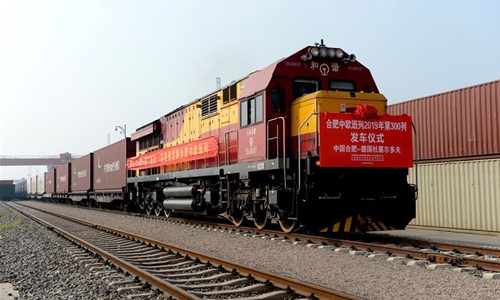
A freight train bound for Dusseldorf of Germany departs from a logistics base in Hefei, east China's Anhui Province, Sept. 27, 2019. The train X8020 carrying household electrical appliances and mechanical equipment departed from the logistics base of Hefei north railway station on Friday, marking the 300th trips of the two-way China-Europe freight trains in Hefei this year. (Xinhua/Huang Bohan)
There has been no sign of decoupling between Europe and China, which remains a very important market for European companies in the post-virus era, and few of them are considering shifting their investments to other markets, European business representatives told the Global Times Wednesday.
"What we have seen in April and May is a very positive trend for European firms in the Chinese market, particularly in the luxury sector and other retailing industries. Sales in May were better than last year's… We expect to see stronger economic links," said a spokesperson of European Union Chamber of Commerce in China (EUCCC).
He spoke on the sidelines of a press conference Wednesday to release the European Business in China Business Confidence Survey 2020 (BCS).
According to the survey, only 11 percent of European companies have considered moving their investments in China to other markets in 2020, compared with 15 percent last year. About 40 percent of the companies said China's research and development (R&D) environment is improving to be better than the world average.
Cha Sheng, general manager of VorWerk China, which is a branch of the Germany-based company, told the Global Times that to take advantage of China's consumption upgrade, VorWerk will invest more in the nation, in particular in R&D. It will also open more stores in third-tier and fourth-tier cities to tap into potential markets.
"We're in China for China." the spokesperson of the EUCCC told the Global Times. The chamber hopes that the Chinese and European governments could work together to address disruptions in supply chains.
According to the survey, 49 percent of the chamber's member companies think doing business in China has become more difficult over the past year, down 4.0 percentage points from 2019.
It pointed to challenges European companies face in China including market access barriers, lack of a level playing field, alleged favorable treatment to state-owned enterprises, most of which observers said were stereotyped and biased .
While about 41 percent of the companies reported at least some market opening, half of them still face market access barriers in China, such as negative lists and opaque licensing procedures.
Charlotte Roule, vice president of the chamber, told the Global Times that she hoped the China-EU comprehensive agreement on investment (CAI) could introduce "some rules avoiding distortion of competition between European and Chinese companies and open China's market more." CAI is also known as bilateral investment treaty in China, which the two sides are expected to sign this year.
Cui Hongjian, director of the Department of European Studies under China Institute of International Studies, told the Global Times on Wednesday that the report disregarded China's tremendous efforts in opening up its economy, while trying to pass the buck when it comes to European companies' failure in China by claiming unfair competition.
"China's pace of opening up is in tandem with that of the EU considering their different stages of development, and the claim of 'unequal market access' is groundless," Cui said.
He also urged EU businesses to better understand the Chinese economic system, where state enterprises play a key role.
Since a meeting between Chinese and EU leaders is expected to be held later this month, during which key issues concerning the BIT will be discussed, analysts said that the timing of the report is likely a bargaining tool for the EU side to ramp up pressure on China.
On Tuesday, the 10th round of the China-EU high level strategic dialogue was hold. During the dialogue, the two sides agreed to develop closer ties on a range of issues, the Xinhua News Agency reported.


